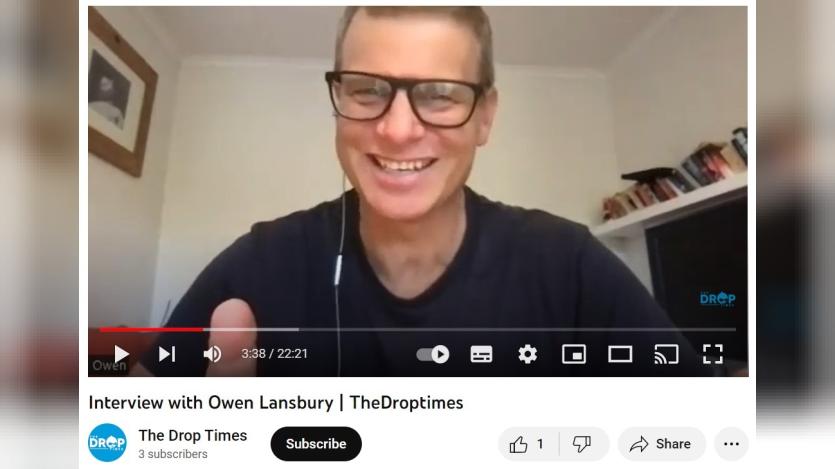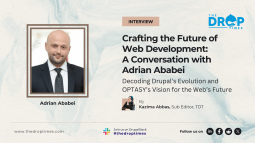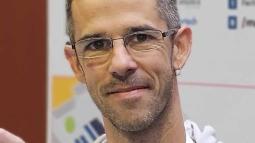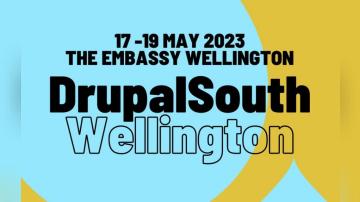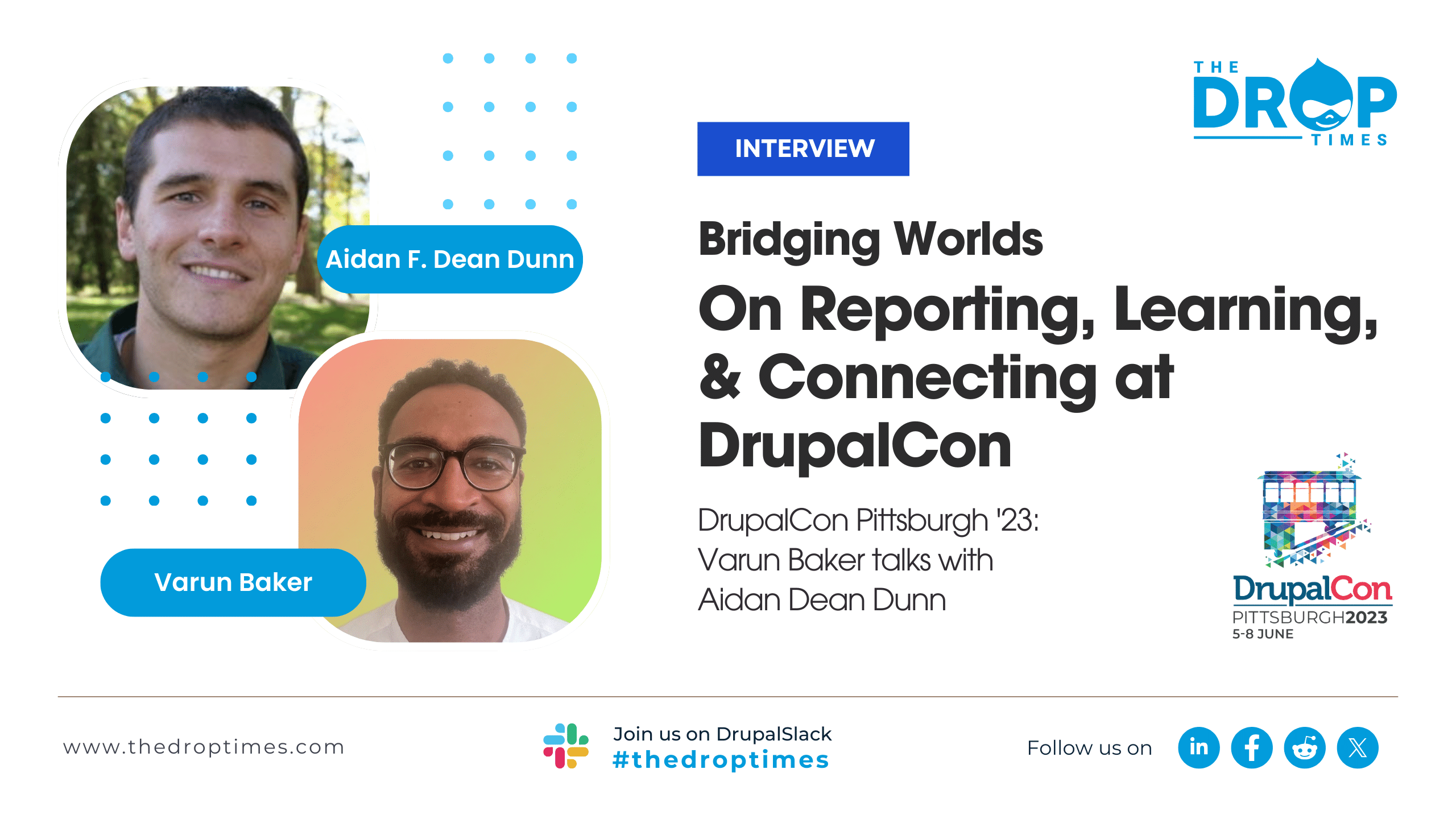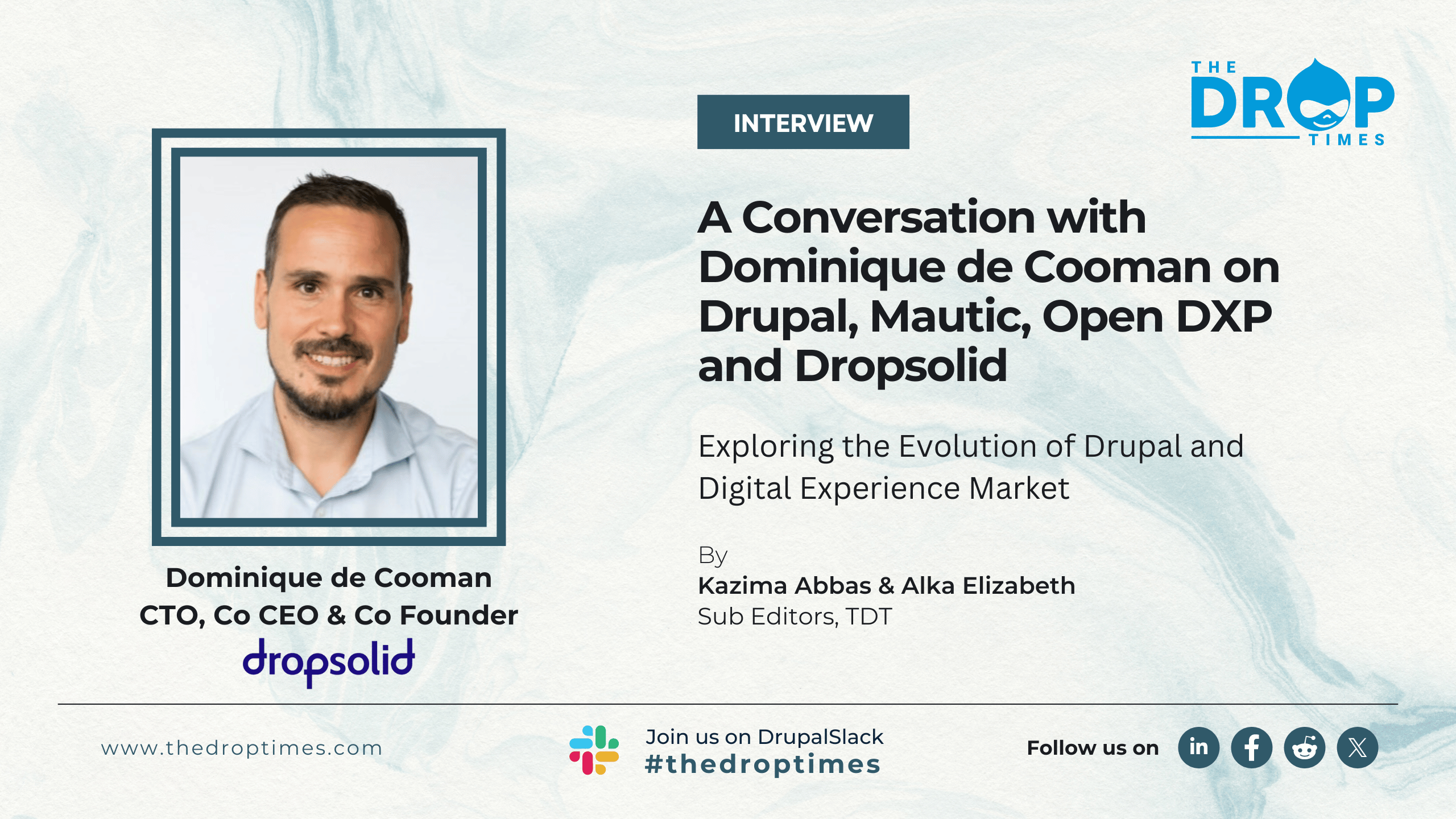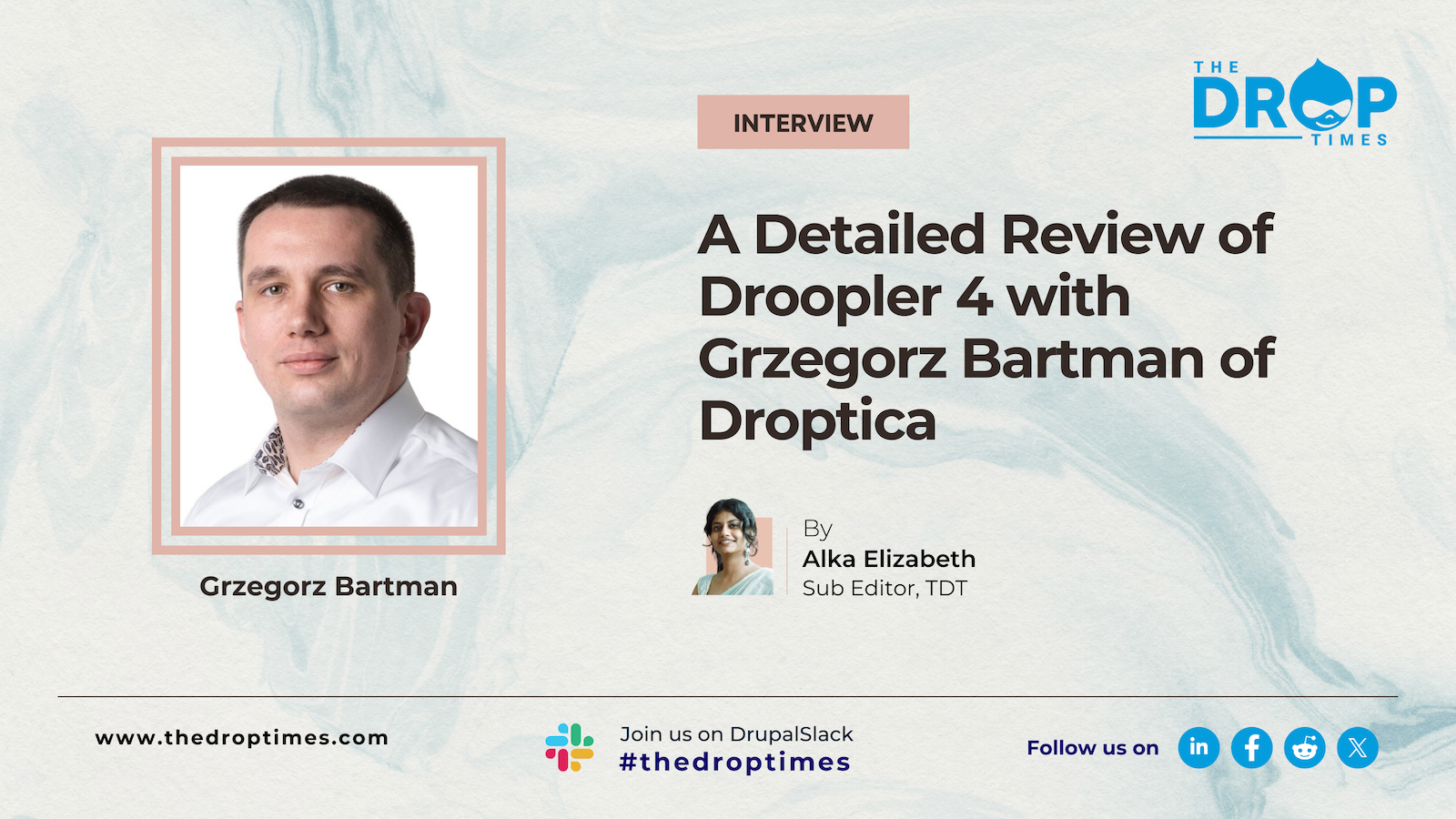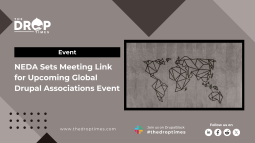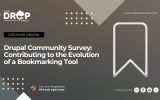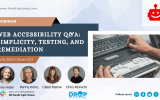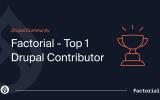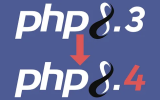DrupalSouth, Owen Lansbury Interview Full Transcript
Alethia [TDT] 00:09
Hello, TDT readers. I'm Alethia from The Drop Times, and I'm joined by Owen Lansbury, who is a part of the Drupal South committee. We have called Owen here to discuss Drupal South this year. The event is to take place in Wellington, New Zealand, and to get an insight into the workings of Drupal, we will be asking him all about it. It's really nice to have you know this discussion in person, and I think we would like to, I would like to start by asking a little bit about Drupal South. Now, we know that it is the longest-running Drupal event in the Asia Pacific region, and we do have a glimpse of Drupal South, of course, on the Drupal South website. We know about the geographical area, but I don't want to miss on the opportunity of asking it from you face to face for you to be able to describe to us what is the area that Drupal South kind of covers?
Owen Lansbury 01:11
My name's Owen Lansbury. Uh, I have been on the Drupal South committee since 2018, and prior to that, I've had a lot of involvement in organizing events, uh, right back to DrupalCon in Sydney in 2013. Um, I'm also on the Drupal Association board at a global level. Um, so I think just some history of Drupal South is that it actually started as an event called Drupal Down Under back in 2008, so I think that's 15 years ago. Um, and it was actually started in New Zealand, so there were a few Kiwis that were very early Drupal adopters who were very enthusiastic, and they started the first Drupal Down Under events. Um, actually, no, they were called Drupal South back then too. I'll just look at my list here, and I should shout out to Bev and Rudge, who was the organizer of those early events. And then the first event that was held in Australia was in 2011, and that was called Drupal Down Under. And, uh, so we had two events in Australia, 2011 and 2012. And then we actually had DrupalCon come to Sydney in 2013, so that was the one that I was involved with, and that was actually the Drupal Association globally coming to Australia, putting on an event. We had quite a global audience attend that, and it's still the biggest one that we ever ran.
So I think we had about 430 people attend that. Dries came and did a keynote, a lot of international people came and took part in the Sprints. And so for the past 10 years, what we've tried to do is we consolidated on the name of Drupal South to represent both Australia and New Zealand, and we've tried to alternate between Australia and New Zealand, normally on two years in Australia, one year in New Zealand. So, uh, the last one that we did in Wellington was 2014, then we had Melbourne and the Gold Coast in 2014-15, and then back to Auckland in 2017. And then we came back to Australia for 2018 and 2019. Uh, and then in 2020, something happened that we couldn't do conferences. I can't remember what it was called... oh, right, COVID. But we actually ran some very successful online events, so we had a DrupalGov focused event in 2020 that had 340 people, and then in 2021, we had a short format virtual conference that had three editions throughout the year. And then last year, in 2022, we came back to Brisbane for our first in-person event since COVID. And this year, we're going back to New Zealand, to Wellington. So, that's everything that we've ever done. Yeah!"
Alethia [TDT] 4:18
You just explained how you decide on, you know, where to base Drupal South every year, but, um, how would the organizers kind of like decide on that location? For example, this year it is in Wellington, as you mentioned. I think the last time it was in Wellington was in 2014. Uh, yeah, so how would the organizers kind of decide on that?
Owen Lansbury 4:42
Yeah, so I should explain that up until 2018, uh, all of the events had been organized just by independent groups. And so what would tend to happen is we get to the end of one conference, and then a couple of people would have a conversation about where the next one would be, and then someone would volunteer to take that on. Uh, they would lose a year of their life, and then we'd have an event at the next place. So we didn't have a lot of continuity in terms of how we were planning the events. And so in 2018, we formed the Drupal South steering committee. And so that committee is formed of five people, two from New Zealand, two from Australia, one from either country. And the idea is that the committee oversees the strategy for the events in the longer term, uh, so that we've got some continuity there.
And then we also, in the past three years, we've engaged a professional event organizer to manage the logistics of the event. Forest, so prior to that, it was purely volunteer. And I think the issue that you have when it's quite a big conference, uh, is that if you're volunteering your time, it's an incredible amount of time that you're having to volunteer. So we have moved to that kind of semi-professional model where there's a committee that sets the strategy and then a professional organizer that handles the logistics. In terms of choosing locations, our mission as Drupal South is to represent Australia and New Zealand, and so it's always going to be in Australia or New Zealand. Uh, it's not really an Asia-Pacific event. Um, and I'll explain a little bit about that in a moment, but, uh, what we try and do is ensure that we've selected a location that is the easiest for the most people to attend.
So we've never done an event in Perth, and I don't think we will, mainly for the reason that coming from Auckland, it would be a 10 to 12-hour trip, whereas if it was in Sydney, it's a three-hour trip. So, uh, that's the biggest factor in terms of how we choose a venue. The second thing is whether we have quite a good local community in that location. So we always have a lot of volunteers who are still working on the event in terms of content selection and management, and then also helping out at the event is people doing the tickets and those types of things. Uh, and obviously, having volunteers who are local to the event helps, but also having a local community that can get around the event and help promote it is also important for us. So, I think those are the main factors.
Alethia [TDT] 7:41
Yes, well, I think now we can talk about attending Drupal South. When it comes to the attendees, who do you think or who should make it to Drupal South, and who is Drupal South directed towards?
Owen Lansbury 8:09
Yeah, so this has always been something that's been quite difficult to balance. Um, because I think you have a lot of different audiences within the Drupal community that have different needs. Um, so of course, there's the developer community, and that can be broken down into front-end, back-end, and a little bit of site building. Um, and what we've tended to find is that that audience is very advanced these days. So Drupal has been running for 20 years, most people have been working in it for about 10, and so what we've tried to do with our developer tracks is to keep the focus quite, um, quite advanced and quite detailed. And we'll always indicate the level of expertise that those talks have, so whether they're entry-level, medium complexity, or high complexity. Um, but the general trend is that they are generally more advanced.
The other audiences are more on the content editing side of things, so Site Builders, content editors, um, and they tend to be people that work within organizations a lot of the time. So the end user or the clients of the agencies that are building the websites, and they tend to be quite hard to reach those audiences. So we have a lot of reliance on our key sponsors, tend to be Drupal agencies and Drupal hosting companies, and we have a lot of reliance on them to actually reach out to their clients to say, "Hey, there's this conference happening, there's a lot of content that will be relevant to what you do every day with Drupal, and we'd encourage you to come." And we have discounted tickets for sponsors to be able to invite their clients on that basis.
Then design and UX, it's always been a factor in the conferences, but it's never really been a core focus. So we'll have design and UX kind of mixed in with a lot of content topics most of the time. And I think what we tend to find is that most of the Drupal agencies that are building Drupal websites, they will have an in-house design team, um, in most cases, or they work with external partners. And a lot of the topics that we talk about in terms of UX for Drupal do tend to be quite universal across web development.
So it's only if you're talking about very specific things that we would get into Drupal-specific topics for UX and design. Otherwise, those talks do tend to be quite general, and it's a good way for the Drupal audience to understand what the trends are that are occurring in the broader web development community. So all of the focus on front-end frameworks and how to design for those, component-driven design, those types of concepts, a lot of those ideas haven't necessarily formed in the Drupal world, they've been imported, and that's the role of those. And then the final audience is the business decision-makers.
So the people that are running Drupal businesses, people that are running Drupal teams within organizations, or people that are choosing content management platforms for their organizations. So they tend to be either project managers or executives who are making those decisions. And so we always try and have a showcase track of case studies about big complex Drupal websites and how they can be applicable to different industry sectors. So whether it's government or higher education or healthcare, we'll always have quite a good mix of those types of case studies. So if someone's coming to evaluate Drupal as a choice that they're considering, then we've got content for them to be able to understand what you can actually do with Drupal. Yep.
Alethia [TDT] 10:41
You did mention that you'll be stepping down, I guess this year, from the volunteering Community Committee. Um, but I think I would like to bring forth a little focus on you and your role in Rupert South this year. Would you be able to just give us a little insight into your role as well as, uh, what is your wish for Drupal South in the upcoming years?
Owen Lansbury 15:38
Yeah, sure. So, I'll start that answer by saying that Drupal is a democracy. So, if you want to see something happen, then just get on and do it. And that's always been, uh, something that I've paid a lot of attention to. So, uh, when we, as a company, first started using Drupal in Australia, there were maybe two or three other companies that were doing that at the time.
This is like late 2000s. And so, for us to actually establish a reputation for Drupal in Australia, we had to do a lot of that work ourselves by promoting Drupal, not necessarily our own company. And so, a lot of my early experience with um being involved in Drupal events came from the idea that for our company to be successful, Drupal needed to be successful. And,, if Drupal was successful, all of that was going to be good for everyone. And so, what we've seen over the past 15 years is uh, Drupal grow into a multi-hundred million dollar industry in Australia and New Zealand. Um, and there are probably 30 or 40 agencies that specialize in Drupal in this region to varying degrees. Uh, so it's become something that's quite significant. And we always kind of say that our biggest competitor in the Drupal world is Adobe. So, if we're pitching on a big project, it's more than likely that there's a big consulting firm coming in and pitching a debut to them. So, uh, so without getting too far off track, my goal has always been that if Drupal is successful, that everyone else benefits in the Drupal community. And so, as far back as 2013 when we ran to Rubicon Sydney, the intention there was to really put Drupal on the map in this region. And we definitely did that at that event. So, we had a government Minister come and talk. It was responsible for I.T policy at the time.
Drupal got heavily adopted within governments through that period as well, and it still is probably the largest used CMS in government. And then all of the subsequent events that I've been involved with since then have been just to maintain the momentum and continuity and the notion of professionalism around the Drupal world.
So, I think people still probably think that open source is more of a grassroots, do-it-yourself style approach to software development, but that is not the case at all. I mean, the companies that are building Drupal sites in this region these days, as would be the case in your country, uh, big multinational consulting firms charging tens of millions of dollars for projects in some cases, and using Drupal in preference to things like Adobe. And so, I think an event like Drupal South is really, really important to maintain that sense of professionalism, knowledge sharing, and collegiality within the community and also amongst competitors, to drive competitors to do better. And I think we have a very strong competitive ethos within the Drupal agency world here.
I think the good thing about Drupal South is that we can come together. We're all friends, but we're friends who are competitors. And a lot of the time, what we're doing as competitors is looking at what other companies are doing in this space and then ensuring that we're working to the same standard. And that just benefits everyone at the end of the day. So, just to kind of wrap up that very long-winded answer, um, I did see, kind of around the mid-2000s, that we did need to maintain that continuity. And so, with a couple of other people in the Drupal community, we formed a pre-committee to establish the subcommittee so that we would have that long-term community continuity.
And so, for the last five years, we've had three rounds of elections of people into that committee, and my goal was to always be at a point, uh, at this point in time, to be able to step away from that and know that the structure of that committee would be able to sustain itself, um, without necessarily relying on one individual. Um, and that's definitely been something that we've been able to achieve quite well. So, and then I think the final part of the question is where I'd like to see it go. Um, and so, I think we do have a very, very high level of professionalism with our events. Um, I mean, I think people often get caught up in the notion of, is it a camp? Is it a con? Um, we've always been of the attitude that this is the only big Drupal event in our region, and it needs to be of a global standard in terms of the quality of the event. Um, and so, we always have it at a good venue, we always have a very strong focus on speaker selection, and really focus on the experience of anyone attending to make sure that it's on par with what they might be paying thousands of dollars for a commercial conference. Um, and obviously, there's a cost that is attached to doing an event of that level of quality, but we've always tried to keep that as low as possible for the actual attendees.
Alethia [TDT] 21:32
Yes, thank you so much for giving us this insight into our Drupal South, and it's really nice to hear from someone face to face to learn more about these events. I guess that really does bring us to an end into what Drupal South is like an event. So, Owen, thank you so much for this opportunity for me and TDT to ask you these questions, and all the best for Drupal South this year. We hope to, you know, see a very successful event, which I'm sure it will be. I think that brings us to the end of this conversation. Thank you again.
Owen Lansbury 22:17
Thank you, and, um, if anyone's interested, the web address for Drupal South is drupalsouth.org.
Disclaimer: The information provided about the interviewee has been gathered from publicly available resources. The responsibility for the responses shared in the interview solely rests with the featured individual.
Note: The vision of this web portal is to help promote news and stories around the Drupal community and promote and celebrate the people and organizations in the community. We strive to create and distribute our content based on these content policy. If you see any omission/variation on this please let us know in the comments below and we will try to address the issue as best we can.



